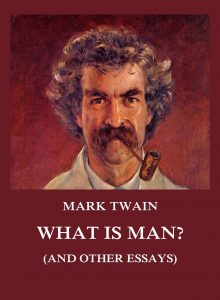What is Man? And other essays – Mark Twain
Twain, embraces some of the latter day thoughts of the great humorist, some shorter and lighter sketches, together with the radical paper from which the book takes its name, never before given public circulation. Among the essays included in the collection are: “The Death of Jean,” “The Memorable Assassination,” “A Scrap of Curious History,” “A Simplified Alphabet,” and “Taming the Bicycle.” In “The Bee” (published for the first time) there are some deliciously funny paragraphs; such as: “Bee scientists always speak of the bee as she. It is because all the important bees are of that sex. In the hive there is one married bee called the queen; she has fifty-thousand children; of these, about one hundred are sons; the rests are daughters. Some of the daughters are young maids, some are old maids and all are virgins and remain so.”
Format: Paperback
What is Man? And other essays.
ISBN: 9783849674625.
Available at amazon.com and other venues.
Biography of Mark Twain (from Wikipedia):
Samuel Langhorne Clemens (November 30, 1835 – April 21, 1910), better known by his pen name Mark Twain, was an American writer, humorist, entrepreneur, publisher, and lecturer. Among his novels are The Adventures of Tom Sawyer (1876) and its sequel, the Adventures of Huckleberry Finn (1885), the latter often called “The Great American Novel”.
Twain was raised in Hannibal, Missouri, which later provided the setting for Tom Sawyer and Huckleberry Finn. He served an apprenticeship with a printer and then worked as a typesetter, contributing articles to the newspaper of his older brother Orion Clemens. He later became a riverboat pilot on the Mississippi River before heading west to join Orion in Nevada. He referred humorously to his lack of success at mining, turning to journalism for the Virginia City Territorial Enterprise. His humorous story, “The Celebrated Jumping Frog of Calaveras County”, was published in 1865, based on a story that he heard at Angels Hotel in Angels Camp, California where he had spent some time as a miner. The short story brought international attention and was even translated into French. His wit and satire, in prose and in speech, earned praise from critics and peers, and he was a friend to presidents, artists, industrialists, and European royalty.
Twain earned a great deal of money from his writings and lectures, but he invested in ventures that lost most of it—notably the Paige Compositor, a mechanical typesetter that failed because of its complexity and imprecision. He filed for bankruptcy in the wake of these financial setbacks, but he eventually overcame his financial troubles with the help of Henry Huttleston Rogers. He chose to pay all his pre-bankruptcy creditors in full, even after he had no legal responsibility to do so.
Twain was born shortly after an appearance of Halley’s Comet, and he predicted that he would “go out with it” as well; he died the day after the comet returned. He was lauded as the “greatest humorist this country has produced”, and William Faulkner called him “the father of American literature”.
(The text of the last section was taken from a Wikipedia entry and is available under the Creative Commons Attribution-ShareAlike License.)
Publisher’s Note: This book is printed and distributed by Createspace a DBA of On-Demand Publishing LLC and is typically not available anywhere else than in stores owned and operated by Amazon or Createspace.

